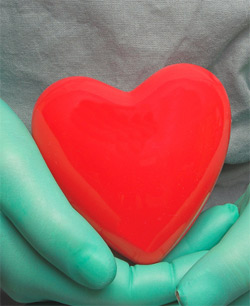fitness news
![]() ,
,![]()
Font size Cardiovascular Health
Predicting Heart Transplant Rejection with a Blood Test
– Reported, September 05 2014

For patients whove had a heart transplant, the surgery is just the beginning. Patients must undergo dozens of tests and biopsies to check for rejection of the donor organ. This can be especially difficult on children. Now a new approach could change the way doctors predict transplant rejection, without expensive, invasive procedures.
Before age 2, Adam Trumbles parents were told Adam needed a heart transplant.
Adams Parents, Timothy and Amy Trumble, told Ivanhoe, It was hard to watch. He just kept getting sicker and sicker.
Adams heart stopped working, but an implanted pump helped him get strong enough for transplant.
Timothy and Amy told Ivanhoe, It was a 6 year olds heart.
That gift saved Adams life, but now he faces another risk.
Michael Mitchell, MD, of Childrens Hospital of Wisconsin, told Ivanhoe, 15% of all patients per year have rejection of their heart.
Yearly heart biopsies test for rejection, but its tough on patients.
Steven Zangwill, MD, of Childrens Hospital of Wisconsin, told Ivanhoe, We bring these kids 5 or 6 times in the first year post-transplant. Its an invasive procedure, not without risk.
Now a new blood test developed by this team could replace biopsies.
“It will be the kind of test that changes the field of transplantation,” said Mitchell.
The test works by looking at the DNA in the blood. The amount of donor DNA in the blood is a clear indicator if or when rejection is beginning.
Mitchell told Ivanhoe, If you pick up rejection early, you can treat it with a prednisone that can be administered at home.
Now 7, Adam takes 3 days to recover from his annual biopsy. A blood test could keep him in the game and able to handle whatever gets thrown his way.
Prednisone costs around $6, while Mitchell says a trip to the hospital with heart rejection can be more than two million dollars for the hospital stay alone. The results from the pilot trial found the blood test to be 100 percent sensitive. It is now being tested in medical centers nationwide.